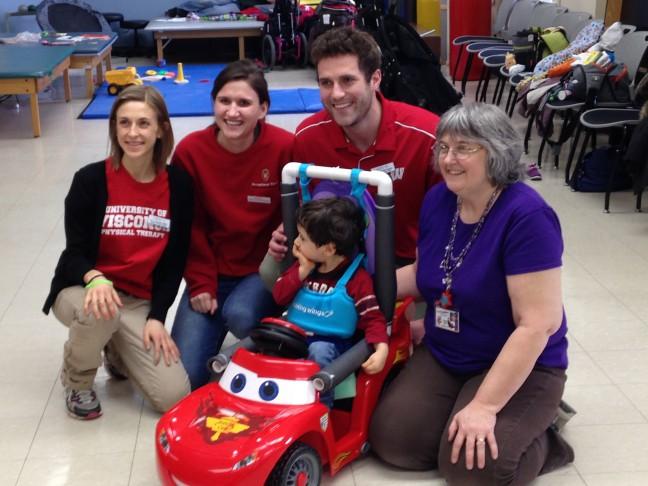A partnership between University of Wisconsin Health and a children’s hospital seeks to help children with disabilities increase mobility with electric toy cars.
The program is an extension of GoBabyGo, which was created by Cole Galloway, a physical therapy professor at University of Delaware. Galloway created this non-profit program as an inexpensive, socially acceptable way to get children with disabilities moving earlier, Karen Patterson, faculty associate in the UW doctor of physical therapy program, said.
Patterson and Annie DeMark Thompson, manager of the UW Health outpatient pediatric rehabilitation program, spearheaded the UW branch.
“Both Karen and I had heard about it through different channels and got together,” Thompson said. “Both of us had wanted to put this together so we joined forces to do it, with us having the ability to generate some funding and have access to these kids who need it.”
Saturday, four children left with adapted electrical cars, Thompson said. Intake forms were filled out for each child so the students could get to know the child, see how they moved and understand each child’s strengths and limitations pertaining to the variety of disabilities, she said.
Adaptations were made to offer more support for the children, such as seat belts or chest harnesses, Patterson said.
“We have a space over at the [physical therapy] school where we have all the supplies that we’ve gotten with our grant money,” Thompson said. “Each car is adapted on site the day the child comes.”
The program used a variety of materials such as PVC, foam noodles, kick boards and anything that could help adapt and provide enough trunk support for children so that they could be safe and upright, Thompson said. Each car was customized and individualized, and that was all done Saturday morning as they met the children, she said.
“It was a great collaborative experience with lots of problem solving and learning on the fly,” Thompson said.
Students also adapted the cars so powering them only required a small amount of pressure, Patterson said.
This is the second building of electric cars that the program has done, Thompson said. In November, UW Health had a smaller scale building where they provided two cars to children, she said.
UW Health received two grants, one through Friends of University of Wisconsin Hospital and Clinics and the second through the American Family Children’s Hospital, to fund this program, Patterson said
Students from the physical therapy program, occupational therapy program and engineering school along with physical therapy faculty members, engineering professors and community therapists all collaborated on the project, Thompson said.
UW Health would like to continue with building days in the future, with one hopefully in early summer, Patterson said. They hope to adapt at least four cars a year, depending on funding and participation, she said.
Three of the children that were provided cars will come back to UW Health for more changes and adaptations as they grow.
“It was amazing to see the look on the parents’ faces,” Patterson said. “When they see their child, really moving like that for the first time, it takes your breath away, it’s an amazing thing.”


